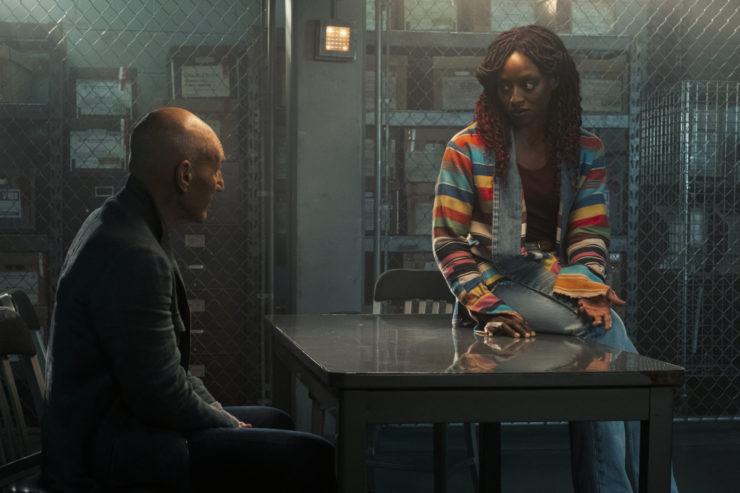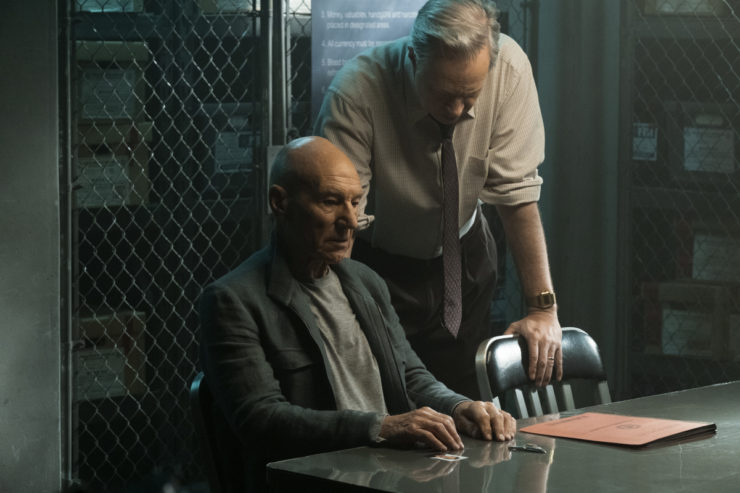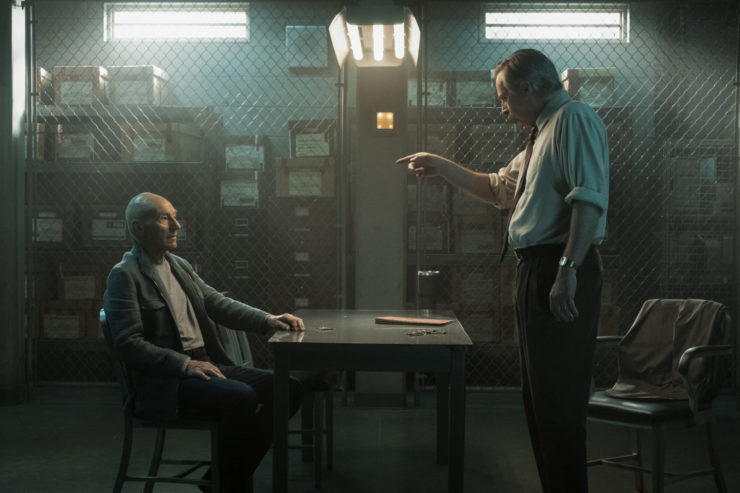There was a theory flying around over the last week that Jay Karnes’s FBI agent who arrested Picard and Guinan at the end of “Monsters” was, in fact, another Q. Me, I was holding out hope that he might be connected in some way to one of Trek‘s previous time-travel adventures—the descendent of, say, one of the people at Area 51 in DS9‘s “Little Green Men” or on the base Kirk and Sulu infiltrated in the original series’ “Tomorrow is Yesterday” or on the aircraft carrier Enterprise in The Voyage Home or something like that. There was also the possibility that Karnes was once again playing Ducane, the thirty-first-century time agent he played on Voyager‘s “Relativity.”
While that particular plot thread does have a reference to a Trek episode that took place in the twentieth century, it wasn’t the one I was expecting.
Agent Wells (no points for subtlety on the name there, kids) came across some Vulcans doing a survey in the woods of Earth when he was a kid. The Enterprise episode “Carbon Creek” established that Vulcan had been observing Earth for some time prior to first contact in 2063, and little Wells stumbled across some of them, and they tried to mind-meld his memories of the encounter away. They didn’t, and he’s been spending his entire life seeking out extraterrestrials, turning himself into a Trek version of Fox Mulder and Dana Scully. He interviews (he says he hates the word “interrogate”) Picard and Guinan in a basement office with broken filing cabinets and non-working surveillance.
Unfortunately, Wells isn’t the star of a TV show the way Mulder and Scully were, so he doesn’t have plot armor, and he gets his ass fired in the end. He hasn’t even filed paperwork on this. (This is probably why he got fired: He had tactical personnel on that raid last week and he retrieved Rios’ combadge from Ramirez’s clinic this week, and there had to be paperwork of some sort on that. If he didn’t, or lied about what it was for, that would indeed get him tossed.)
This is, to say the least, an anticlimax. Picard is able to bring closure to Wells’ childhood trauma by telling him exactly what it was he saw as a kid as well as what they were doing, and I suppose it’s possible that this will relate to Picard’s own childhood trauma, which we were explicitly told last week that we’re not done exploring. But it also feels spectacularly pointless in the end, a waste of an actor of Karnes’ caliber.
We do get more about Q, at least, which is good to see. Turns out the summoning did work, but Q is sufficiently depowered at this point that arriving for the summoning takes a bit of effort on his part. He has enough mojo to fake being an FBI agent, but not enough to teleport—or to vaporize Guinan, despite his desire.

Q—in a portentious bit of speechifying that John deLancie does better than almost anyone—is, in fact, dying. Q is disappointed, as he was hoping for something spectacular and new. Life as an immortal can get tedious, after all. But instead of going out in a blaze of glory, as he was hoping, he’s just fading away. It’s still not clear what his endgame is. While deLancie beautifully plays Q’s bitter disappointment in how his long life is stumbling to an end, we’re no closer to understanding why he’s doing all this.
We have no idea why he shoved Picard and the other people who happened to be in the opening credits of Star Trek: Picard into an alternate timeline where humans are fascists. We have no idea why he’s given Kore a vial of blue liquid that cures her of her genetic dysfunction (it has a tag on it that reads “FREEDOM,” and I’m hugely disappointed that it didn’t say “DRINK ME”). We have no idea why he’s pretending to be Renee Picard’s shrink. And we have no idea why he gives Guinan a clue as to how to get out of being in federal custody—though his comment that humans are trapped in the past could just as easily be about Picard as it is Wells.
Buy the Book


The City Inside
On La Sirena, Ricardo is enjoying the heck out of being on a real spaceship, while Rios and Ramirez do more flirting, culminating in a smooch that is, of course, interrupted by Ricardo. While the reason for Ricardo’s interruption is a joy—he’s sick from eating too many sweets ordered via replicator—the actual progression of this particular romance is tiresomely rote. The sheer charm of both Santiago Cabrera and Sol Rodriguez keeps it from being unbearable, but its not aided by a script that hits all the tired beats.
And it’s especially frustrating because the romance that we supposedly came into the season with has gotten completely short shrift. The first season ended with Musiker and Seven holding hands, a relationship that came completely out of left field. By the time we see them again in “The Star Gazer,” the relationship has gone from brand-new to “it’s complicated.” We get the two of them talking about their relationship, even going so far as to having a meta commentary about how they’re the main event where Rios and Ramirez are the side show, but Rios and Ramirez have actually had an onscreen kiss—Seven and Musiker haven’t even been physically affectionate yet this season. It’s depressing that we can only get romance and smooching in the heteronormative relationship. I’ve come to expect better from the Secret Hideout shows, which have been much better about this sort of thing, but alas. (The original audio drama No Man’s Land by Kirsten Beyer & Mike Johnson does explore the Seven-Musiker relationship, and somehow it’s not surprising that—as ever—the tie-in fiction is better at portraying non-hetero relationships than the so-called main events.)
We do, at least, get the two of them talking about their relationship, though the big character moment is Seven accusing Musiker of manipulating people, and, well, duh. This has been an established part of her character all along, seen particularly in “The Impossible Box,” where she expertly manipulated Captain Bosch. But it does give us an excuse for this week’s “oh, yeah, Evan Evagora is in the opening credits, we should give him something to do” scenes. In this case, it’s a flashback to Elnor helping Musiker fix something on La Sirena (because to have it take place somewhere else would require a different set; this is the first Secret Hideout show that has shown any evidence of budget-saving, and it’s kinda sad). He’s talking about going on a Qowat Milat mission and putting off Starfleet Academy for another year, and Musiker guilts him into not doing that.

Having said all that, the Seven-Musiker part of the storyline is the most compelling, not because of the lack of romance or the gratuitous Elnor scene, but because we really dig into Seven’s scars as a former Borg drone. Jurati is slowly turning into a new Borg Queen, and Seven and Musiker are trying to track her down. While she doesn’t have her implants anymore, and therefore doesn’t have the means to track Jurati that way, Seven can think like a Borg. It isn’t pleasant for her, and Jeri Ryan, as always, plays it all magnificently. The trauma of reliving her assimilation and having to think in a way she hasn’t had to regularly since Voyager separated her from the Collective twenty-six years earlier is etched all over Ryan’s face.
They find the corpse of a guy Jurati left the club with. They also find his smartphone, trashed. While the corpse tells them some useful stuff—the Queen can’t assimilate anyone yet—it’s the phone that’s particularly useful. Seven is triggered by the smell of the broken battery in the phone, and Musiker scans it. The battery contains lithium ions, a stabilizing element.
That leads to a particularly powerful moment: When you’re assimilated, the victim is flooded with a stabilizing element in order for the organic body to be able to handle being injected with nanoprobes. The smell of the phone and its battery triggers a memory from when Seven was assimilated at age six, one strong enough that she can taste the stabilizing agent the Borg injected her with all these decades later.
This, in turn, leads to a nasty visual: Jurati ripping apart car batteries and consuming the lithium—right before she kicks Seven and Musiker’s asses.

The Borg Queen’s goal is to find Adam Soong, and now we find out why he’s so important: According to the Queen, Soong and the Europa mission are turning points. The find Renee will make will render Soong’s work obsolete, supposedly, and so it must be stopped. The Queen plays to Soong’s ego, making it clear that if the Europa mission is scrubbed, he’ll be the vanguard of a great future. Soong’s final confrontation with Kore before she walks out the door makes it clear that playing to Soong’s ego is the right call, as it’s his most prominent feature. His protestations to Kore that sure, he also loves her, not just what he’s accomplished with her ring incredibly false, and Kore sees right through it. Her departure—facilitated by Q providing her with a cure—puts him in a massive depression, which makes him an easy target for the Queen’s manipulation.
Again, the endgame here is really unclear. Is Q trying to aid the Borg Queen in her quest? Does he have his own reasons for sabotaging Europa? Is he really trying to sabotage Europa?
It’s not clear, but we do know the Queen’s immediate goal: get Soong to give her an army. Soong’s money provides a team of mercenaries, whom she then starts to assimilate.
We don’t see Annie Wersching in the episode, we only see Alison Pill playing the Queen. There’s no overt sign of Jurati in the episode. The closest we come is that the Queen stops short of strangling Musiker to death, which is either a sign that Jurati’s still fighting or a reminder that people in the opening credits have plot armor. (Not all of them, as Elnor proves, but still, Jurati didn’t stop the Queen from cutting the throat of the guy from the club. As usual, death only matters when the character has billing.)
At this point, they’ve not only stepped on butterflies, they’ve napalmed an entire colony of butterflies. One wonders how this toothpaste is going to get put back in the tube…
Keith R.A. DeCandido will be participating in the online gaming convention TogetherCon, run by Real Women of Gaming. He’ll be doing a Q&A on writing fiction based on games from 3-4pm Eastern. Click here for more information.










